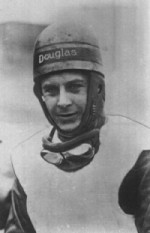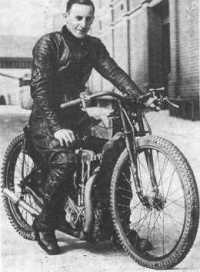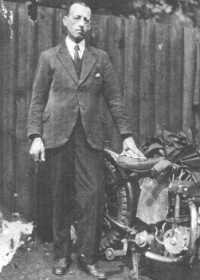

Refurbishing
Apologies for the dropsheets, paint tins and scattered detritus. More information...

Although riders like Vic Huxley, Charlie Spinks and Frank Charles, often took corners with the throttle wide open on the Peashooters, there was a cut-out button mounted on the left handlebar. The throttle was difficult to control in any other position but wide open on this bike and speed and control often relied on the cut-out button rather than the throttle. Spinks in particular, who was one of the most daring riders of that time, was noted for his ability to literally step off an impossible situation. It was by use of this button that he managed such control. Just the same, the name Daredevil Charlie was hard-earned and had many scars and badly mended bones to show for his participation in the sport.
In 1930, when the quick action throttle was introduced on the Douglas, it was revolutionary. Although basically not much more than an enlarged twist grip, it provided a control which had been hard to get before. Huxley's control was masterful, 1930 was known as Huxley's year. The best riders of those days, including Spinks, Huxley and Charles, began their careers on the Peashooter In the 350 cc capacity size they were clear favorites for many years. Many later bikes show obvious Peashooter influence and even today this can still be seen in most modern speedway machines.

One of Huxley's great attributes was his ability to ride just about anything and win. He was not slavishly
fond of any bike in particular.
(Right: Seen here is Vic on
a J.A.P which he used from 1932 onwards). Although many of his early races were
won on a Peashooter, he changed mounts many times. He was always looking
for more advanced machines. In 1931 when he had returned to England to
take delivery of a new Douglas which had been specially built for him by
the factory, he happened across a Rudge. He had just stepped off the
Douglas on which he had just stripped seconds off his previous best time
when he saw the new bike. He rode it immediately and although his
impression was that it was slower than the Douglas, he found his times
had in fact been better. He bought it immediately.
Charlie Spinks who had been watching the whole incredible
performance from the side, stepped in "How much do you want for the old
bike Hux'?" he asked, indicating the brand-new Douglas. Charlie bought
that machine on the spot.
The Rudge was an interesting bike of that period. One journalist reported: "A machine specially intended for dirt tracks has been designed by S. T. Glanfield. who recently completed a tour of the world on a Rudge Whitworth sidecar outfit. "Already a number of riders have applied for duplicate machines. The new model is to be marketed under the name of Glantield-Rudge-Special. A 499cc Rudge Whitworth engine is used in a duplex frame with straight tubes bolted together. If through a crash, one of the tubes should be bent, it can be instantly replaced. Wheels and forks are standard Rudge Whitworth fittings, and an Andre steering damper is used. "Adjustment is provided for the single footrest, which is on the right hand side. There are no projections whatever on the left side of the machine. No brakes are fitted, and though the one machine at present in existence has a clutch, it is intended to dispense with this later. The single gear ratio is 8:1. The petrol tank holds one gallon"

During his British tours Huxley kept up to seven motorcycles and had two mechanics working full time on them as he was riding five and a half days and nights a week. Huxley's chief mechanic in those days was Dick Dendy. Mrs Huxley remembered him as a man who seldom smiled: "He always looked like he worked for an undertaker," she remembered fondly. "He was one of the greatest mechanics in the world", said Vic. "But it is true he was always very glum". When Vic would come off the track invariably having just won another trophy or shattered a record, all Dendy would say was: "Well another Indian bit the dust I suppose." Then he would go back to his spanners without another word. Right: Dendy minus a smile.
Huxley always placed great faith in his mechanics, often working along
with them. He paid them well and trusted them implicitly and Dendy was
no exception. He became a great friend of the Huxley family. It was
probably this friendship which inspired Dendy to devote the time
necessary to inventing a chain tensioning device which must have
been responsible for some of Huxley's success.
Under the double headings of "The Chainbreaker" and "Huxley's
Destructive Ways" one journalist of the time reported: "The brilliant
young Queensland motorcyclist Vic Huxley, who is without a peer on the
speedway is a rider who combines skill with daring.
Vic has only one
fault - he is too hard on machines. Of course, it may be advanced that
the motorcycle manufacturers do not make their machines strong enough,
or rather that the makers of roller chains do not manufacture a chain to
stand up to the severe testing to which a rider like Huxley subjects
them. The fact of the matter is that it is not the strength of the chain
which is at fault at all. but the weakness which is inherent in every
roller chain which has been manufactured. When the machine's frame gives,
the chain line cannot be kept straight and the chain hits one or other
of the sprockets on a twist and a break follows as a matter of course."
Vic remembered those chains, "The frame used to flex a bit and this
caused some of the trouble, but mainly they broke because of the cinders.
Thy used to get so full of dirt it would tighten the chain and break it.
One of the things we tried was to use a 5/8 x 3/8 chain on a 5/8 x 3/4
sprocket. They had to use cinders in England because of the wet. They
used to have to stop the races to grade them often enough."
Dendy worked hard on that problem and came up with a tensioner which
eased this problem. It was constructed to guide the chain onto the sprocket
and prevent the chain from twisting.
The extra reliability helped to bring more coveted prizes to Vic.